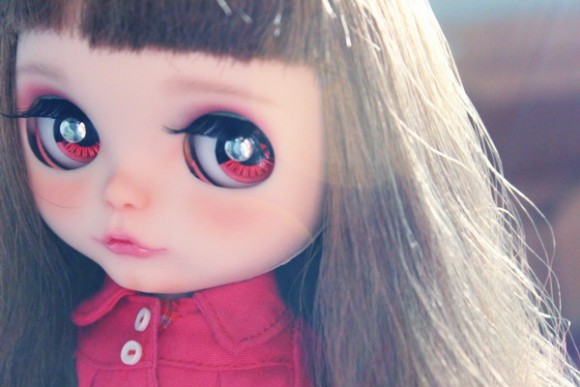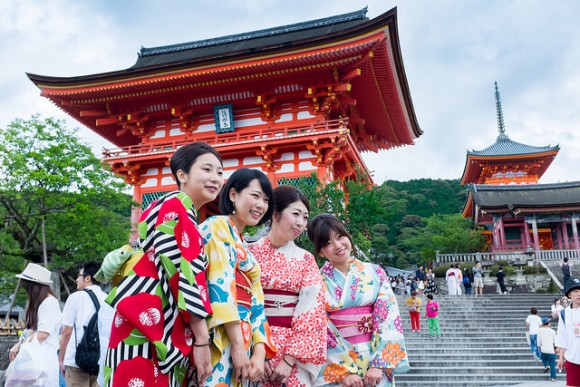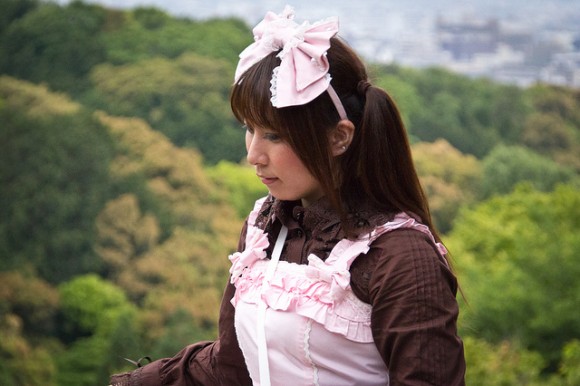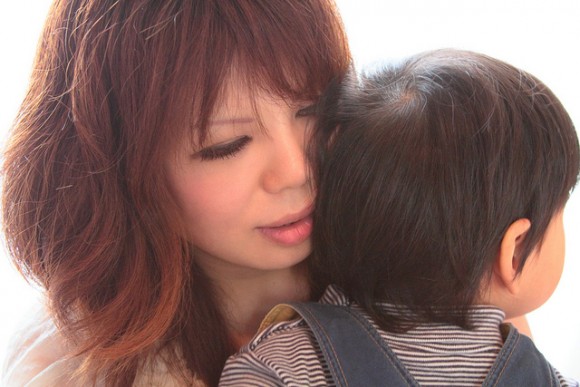
Want to wear Hello Kitty accessories and still be taken seriously? In Japan you can. Here’s why.
As we’ve previously discussed, Japan remains a largely patriarchal society. There is a gender gap, and while women in Japan today may have more opportunities to advance at work than before, many women still choose a life of childrearing and home-making over grinding away in an office. In fact, some women might even say that there’s a lot of perks to being a woman in Japan.
Personally, as a foreign woman living in Japan, I find one of those perks includes being able to be girly without annoying other people, attracting the wrong kind of attention, or being taken less seriously.
Increasingly in the west, there is a tendency to look down on feminine women who delight in frills, bows, cupcakes, and kittens, or who aspire to run a household and raise children. In a world where women who dress up to the nines in casual situations such as college campuses can receive bucketfuls of vitriol hurled at them and where openly kooky, adorkable actress Zooey Deschanel is heaped with ridicule for naming her newborn baby girl “Elsie Otter”, is there anywhere left where it’s okay to be, well, girly anymore?
▼ Japan!
In Japan, they have something called “joshiryoku” which literally translated means “girl power”. However, rather than conjuring up images of boldness and toughness, “girl power” in Japan means embracing one’s femininity. “Joshiryoku“, therefore, could more accurately be translated as “feminine power.” Here are a couple of reasons why it’s considered totally okay to be a girly girl in Japan.
1. In Japan, women are celebrated for their feminine characteristics
The line between the sexes is still quite defined in Japan (although that line is increasingly beginning to blur). Here, they haven’t reached the stage of (as an extreme example that was in the news recently) banning boys from playing with Legos in order to push traditionally masculine toy preferences on girls, and it’s still completely accepted for adults to tell little boys how tough they are, and to tell little girls how cute they are without worrying that they are contributing to gendering. For better or worse, it’s sort of a different world in Japan, .
▼ Being able to wear a giant bow on your head with zero irony is one example of women in Japan having more freedom to be girly.
And, in this world, women are able to be women without feeling pressure to act more like men. While traditionally masculine traits such as aggressiveness and assertiveness undoubtedly contribute to success in the boardroom, for women who have no desire to climb the career ladder, there is little incentive to adopt these characteristics. Instead, being communicative, empathetic, and caring tend to benefit women who take on more traditionally “feminine” roles such as home-making, kindergarten teaching, and the like.
Since feminism isn’t at quite the same stage in Japan as in the west, it’s a harsh reality that for many career-minded Japanese women, there are higher hurdles in their way since society here has different expectations of women. But for those women who aren’t as naturally business-focused, there is little need to worry about society “expecting” them to, for example, return immediately to work after having children or pay for daycare while they return to the office, even if they don’t want to. Some aspect of this is economic, as well – it’s still quite normal in Japan for families to exist on a single salary, whereas in the west households often require two working partners.
2. In Japan, women enjoy more freedom to dress up without being catcalled
Japanese women enjoy the freedom to put on makeup and high heels just to take a trip to the grocery store, if they feel like it (and many of them do). In the U.K., where I’m from, people tend to dress more casually in general situations, unless it’s a special occasion. There’s also the risk of attracting unwanted attention in the form of street harassment. I mean, yes, in a perfect world we’d all be able to walk down the street wearing whatever the hell we want and not hear a squeak from anyone about it, but we don’t live in a perfect world. And in the west, yep, it’s still entirely possible to be catcalled walking down the street in a pair of sweatpants and a huge padded winter coat.
In Japan, however, where losing face in public is a common fear, catcalling is much, MUCH less prevalent. Yes, nanpa (guys approaching girls on the street to ask them out) does happen and it does make many women uncomfortable, but it doesn’t seem to be done with the same malice as does street harassment. Not having to worry about people loudly passing judgement on your outfit on the street in Japan means that women have more freedom to dress in whatever they want to wear, even if that’s a Little Bo Peep style Lolita dress with matching frilly accessories.
I would be remiss not to mention that Japan does have a problem with chikan (train groping) which brings misery to women who suffer through it in silence out of fear of speaking out. However, wearing a short skirt, heels, and a lot of makeup is so common in Japan as to not even raise an eyebrow, and in a society where most people are dressed up, you don’t feel like you’re standing out too much if you join in. In fact, a lot of foreign women who come to Japan gradually find themselves altering their wardrobe as a result of feeling less satisfied wearing the jeans and sneakers which are more commonly worn in their home country, and some describe this increased freedom to “dress girly” as one perk of living here.
3. Japan loves cuteness un-ironically
Another reason why being ultra-feminine is more accepted here is that in general, Japan just loves cute stuff. Grown women walk around with tote bags, key chains, and phone straps proudly featuring adorable characters like Rilakkuma, Funasshi, and Hello Kitty.
Even guys get in on the act sometimes! And nobody calls them childish or questions their manhood (at least, not unless they’re a big jerk). Guys, want to wear a pink shirt but worried that it’s too feminine a colour? Nobody will mind in Japan! Girls, want to walk around wearing a cuddly panda on your head? Go for it. If you’re a girly girl (or guy) who loves cute characters, cuddly toys, and fluffiness, Japan is basically your playground.
It does seem curious and counter-productive sometimes that in fighting for equality for women, there is often a temptation to laud the adoption of male characteristics while scorning female ones. We could also say that being feminine in Japan isn’t always a choice so much as it is a result of social pressure. But in Japan, femininity is widely considered a vital tool for navigating the world as a woman, rather than as an obligation or hindrance.
Top image: Flickr/渺 渺





 What Japanese women really think about the gender gap in Japan【Video】
What Japanese women really think about the gender gap in Japan【Video】 Elegant new bar and club space especially for crossdressers to open in Tokyo
Elegant new bar and club space especially for crossdressers to open in Tokyo Japan slowly begins to openly discuss crossdressing men in heterosexual relationships
Japan slowly begins to openly discuss crossdressing men in heterosexual relationships Anime artist illustrates the differences between Japanese fashion now and ten years ago
Anime artist illustrates the differences between Japanese fashion now and ten years ago On the short side? Lucky you! Japanese women describe what they love about shorter men
On the short side? Lucky you! Japanese women describe what they love about shorter men Non-tourist trap fish market in northeastern Japan captures our hearts with amazing sashimi
Non-tourist trap fish market in northeastern Japan captures our hearts with amazing sashimi Kyoto becomes City of Yokai, with Night Parade of One Hundred Demons festival this autumn
Kyoto becomes City of Yokai, with Night Parade of One Hundred Demons festival this autumn Japan’s newest life-size Gundam is finished, receives Shinto blessing in Osaka【Video】
Japan’s newest life-size Gundam is finished, receives Shinto blessing in Osaka【Video】 Chinese drivers flocking to Japan for quick and easy route to international licenses
Chinese drivers flocking to Japan for quick and easy route to international licenses One of Japan’s most awesome rail passes, the Seishun 18 Ticket, just got a lot less awesome
One of Japan’s most awesome rail passes, the Seishun 18 Ticket, just got a lot less awesome No train, no hotel – How to do an overnight bus trip to Kanazawa from Tokyo – Part 1【Photos】
No train, no hotel – How to do an overnight bus trip to Kanazawa from Tokyo – Part 1【Photos】 McDonald’s Japan debuts new anime girl mascot character with incredibly long name
McDonald’s Japan debuts new anime girl mascot character with incredibly long name Korean basketball coach humiliates player live on TV, tapes his mouth shut
Korean basketball coach humiliates player live on TV, tapes his mouth shut We try a delicious hidden gem in Fukuoka, unknown to even Japanese people
We try a delicious hidden gem in Fukuoka, unknown to even Japanese people Studio Ghibli releases new “Butterflies in the Forest” Totoro towels
Studio Ghibli releases new “Butterflies in the Forest” Totoro towels What’s the deal with akebi, the perfectly purple, alien-like fruit that’s in season now in Japan?
What’s the deal with akebi, the perfectly purple, alien-like fruit that’s in season now in Japan? Totoro, Calcifer, other Ghibli stars returning as humidifiers ahead of Japan’s dry winter days【Pics】
Totoro, Calcifer, other Ghibli stars returning as humidifiers ahead of Japan’s dry winter days【Pics】 Is downtown Tokyo’s crazy cheap 290-yen bento boxed lunch shop still around, and is it still cheap?
Is downtown Tokyo’s crazy cheap 290-yen bento boxed lunch shop still around, and is it still cheap? Meet the kind Japanese grandpa who takes photos for tourists at the Hachiko statue in Shibuya
Meet the kind Japanese grandpa who takes photos for tourists at the Hachiko statue in Shibuya Studio Ghibli releases new mug tumblers featuring anime movie characters
Studio Ghibli releases new mug tumblers featuring anime movie characters How to power up the coolest cheap souvenir from Nintendo’s official shop with a trip to Daiso
How to power up the coolest cheap souvenir from Nintendo’s official shop with a trip to Daiso Why was the Lithuanian ambassador to Japan working in a fast food beef bowl joint in Tokyo?
Why was the Lithuanian ambassador to Japan working in a fast food beef bowl joint in Tokyo? Line of foreign tourists leads us to Akihabara’s meatiest fatty ramen【Taste test】
Line of foreign tourists leads us to Akihabara’s meatiest fatty ramen【Taste test】 Japanese convenience store Family Mart announces abolishment of eat-in spaces
Japanese convenience store Family Mart announces abolishment of eat-in spaces Studio Ghibli releases new insect whistle necklace from Nausicaä of the Valley of the Wind
Studio Ghibli releases new insect whistle necklace from Nausicaä of the Valley of the Wind Totoro sequel anime Mei and the Baby Catbus will screen at Ghibli Park this winter
Totoro sequel anime Mei and the Baby Catbus will screen at Ghibli Park this winter Starbucks Japan unveils Halloween Frappuccino for 2024, and it’s like drinking a magic spell
Starbucks Japan unveils Halloween Frappuccino for 2024, and it’s like drinking a magic spell Evangelion creator Hideaki Anno returning to anime with new project for 50-year-old franchise
Evangelion creator Hideaki Anno returning to anime with new project for 50-year-old franchise Studio Ghibli releases new Howl’s Moving Castle goods that capture the magic from the anime movie
Studio Ghibli releases new Howl’s Moving Castle goods that capture the magic from the anime movie Adult Jam Bread causes a stir at store in Tokyo
Adult Jam Bread causes a stir at store in Tokyo Right now is the peak time to go to Tokyo’s most-beautiful-view beer garden【Photos】
Right now is the peak time to go to Tokyo’s most-beautiful-view beer garden【Photos】 Pizza Hut adds a “Guilty Secret” sandwich to its menu for a limited time
Pizza Hut adds a “Guilty Secret” sandwich to its menu for a limited time McDonald’s new Happy Meals offer up cute and practical Sanrio lifestyle goods
McDonald’s new Happy Meals offer up cute and practical Sanrio lifestyle goods Foreign tourists on Shinkansen bullet train break suitcase etiquette, angering local passengers
Foreign tourists on Shinkansen bullet train break suitcase etiquette, angering local passengers [Deleted] Article written for April Fool’s Day 2018
[Deleted] Article written for April Fool’s Day 2018 Japanese government to make first change to romanization spelling rules since the 1950s
Japanese government to make first change to romanization spelling rules since the 1950s Foreigner’s request for help in Tokyo makes us sad for the state of society
Foreigner’s request for help in Tokyo makes us sad for the state of society Ghibli founders Toshio Suzuki and Hayao Miyazaki contribute to Japanese whisky Totoro label design
Ghibli founders Toshio Suzuki and Hayao Miyazaki contribute to Japanese whisky Totoro label design Tokyo’s most famous Starbucks is closed
Tokyo’s most famous Starbucks is closed Princesses, fruits, and blacksmiths: Study reveals the 30 most unusual family names in Japan
Princesses, fruits, and blacksmiths: Study reveals the 30 most unusual family names in Japan Doraemon found buried at sea as scene from 1993 anime becomes real life【Photos】
Doraemon found buried at sea as scene from 1993 anime becomes real life【Photos】 Pantene ad asks why people in Japan are forced to look the same when job hunting
Pantene ad asks why people in Japan are forced to look the same when job hunting 9 middle-aged Japanese men come to work in the clothes they’d like their partners to wear
9 middle-aged Japanese men come to work in the clothes they’d like their partners to wear Blogger offers her top four tips for Japanese women dating foreign guys
Blogger offers her top four tips for Japanese women dating foreign guys Nadeshico Sushi restaurant challenges gender roles with all-female staff clad in kimono
Nadeshico Sushi restaurant challenges gender roles with all-female staff clad in kimono Still don’t want a smartphone? Japanese women might want you
Still don’t want a smartphone? Japanese women might want you Japanese women asked what they would do if they had a man’s body for one day in survey
Japanese women asked what they would do if they had a man’s body for one day in survey Why aren’t there more female entrepreneurs in Japan? Pull up a chair… 【Women in Japan Series】
Why aren’t there more female entrepreneurs in Japan? Pull up a chair… 【Women in Japan Series】 Our male Japanese-language reporter gets a professional makeover, becomes pretty cheerleader
Our male Japanese-language reporter gets a professional makeover, becomes pretty cheerleader What’s the best way to close the gender gap in Japan? Japanese women weigh in
What’s the best way to close the gender gap in Japan? Japanese women weigh in List of jobs in Japan that “don’t allow women to wear glasses” upsets fans of vision, meganekko
List of jobs in Japan that “don’t allow women to wear glasses” upsets fans of vision, meganekko Four things women are banned from doing in Japan【Women in Japan Series】
Four things women are banned from doing in Japan【Women in Japan Series】 Improve your summer dating knowledge with these Japanese dating app survey results
Improve your summer dating knowledge with these Japanese dating app survey results Tokyo school teaches cross-dressing men, transgender individuals to move and speak femininely
Tokyo school teaches cross-dressing men, transgender individuals to move and speak femininely 5 powerful reasons to be a woman in Japan 【Women in Japan Series】
5 powerful reasons to be a woman in Japan 【Women in Japan Series】 Japan’s number one cosplayer Enako wows crowds at Halloween event in Tokyo
Japan’s number one cosplayer Enako wows crowds at Halloween event in Tokyo
Leave a Reply